Daily Comment (October 3, 2017)
by Bill O’Grady and Thomas Wash
[Posted: 9:30 AM EDT] Financial markets are very quiet this morning. Because it’s quiet, let’s take a look at Europe:
Catalonia, Spain and the EU: Every nation is a construct. It is built on a social contract that offers various public goods in exchange for membership. First and foremost, states offer protection from outside threats. A nation that cannot protect its citizens from outside invaders has a difficult time demanding allegiance. Second, it also must create internal conditions that make membership attractive. These include public goods like security, which include policing protections for life and property, and usually some socialization from the vicissitudes of life. These can include old age pensions, unemployment insurance, health insurance, price protections for basic life staples, etc. Third, most states also support social goods, such as parks, the arts, etc.
It is not uncommon for divisions within nations to develop. Regional, ethnic or religious differences can trigger aspirations for separation. For the most part, modern democracies manage these differences in two ways. Most democracies are federal; they offer some degree of local autonomy to deal with regional differences. Laws are usually put in place to protect some degree of religious and ethnic freedom. Usually, the combination of federalism and legal protection is enough to manage internal differences and maintain a nation.
However, these mechanisms are imperfect and there are numerous examples of internal divisions becoming so acute that civil conflict develops. The history of Europe shows floating borders. Our first example is the map of Europe in early 800 AD. Notice that most of central and eastern Europe were tribal.
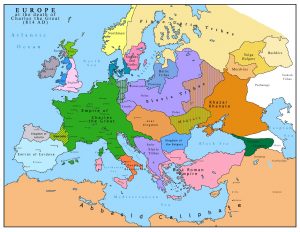
By 1200 AD, various nations, kingdoms and principalities were starting to emerge.
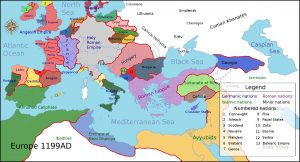
Three hundred years later the remnants of the Byzantine Empire were gone, replaced by a group of nations in the Balkans. France was starting to develop. Note that the Iberian Peninsula was five nation states, including Aragon, which is much of modern-day Catalonia.
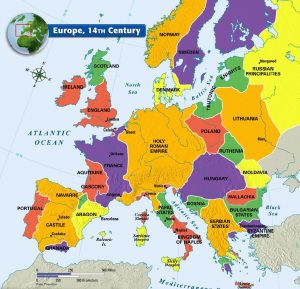
Below is a map of Europe at WWI.
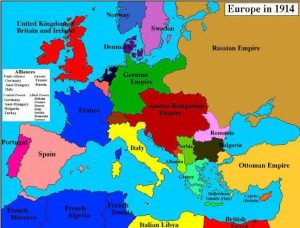
Note that many of the various principalities and kingdoms were absorbed into large empires. This consolidation occurred for two reasons. First, powerful groups conquered these areas to build large nations. Second, war was common in Europe and smaller nations found they had more protection by banding together to form empires.
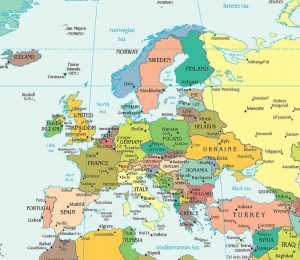
Finally, this map shows Europe today. In the aftermath of two world wars, Europe once again became a continent of smaller nations. Europe has generally been stable despite these smaller states because the continent outsourced its defense to the U.S. under the guise of NATO. In comparing this map to earlier maps, one cannot help but notice that the Balkans, who were united under the nation of Yugoslavia, have seen significant devolution into a series of small nations. Why should France, Germany, Spain, Italy, et al. not see a similar breakdown?
This is the conundrum the EU faces. The EU is attempting to consolidate Europe into a loose, single federal entity; however, within European nations, there are growing efforts for self-determination. It’s not just Catalonia…Scotland has been flirting with independence, Czechoslovakia divided into two states and Belgium has been on the brink of division for years. The EU has generally tried to discourage the breakup of current nations within Europe, but the trends on the ground appear to be moving in the direction of increased local control.
So, how does Madrid keep Barcelona in Spain? Truncheons and rubber bullets may have won a temporary stay but at the cost of looking desperate. How does London keep Edinburgh in the U.K.? If we revert to our first paragraph, it would seem that the key is being able to offer internal and external security along with an environment that supports economic growth and an attractive culture. Suppression doesn’t work forever. If Europe faced a significant external threat and the U.S. wasn’t there to protect it, the drive to self-determination would likely be stifled. However, in the absence of an external threat, self-determination and the trend for devolution appear difficult to suppress. In other words, if nations want to hold together, making membership attractive is probably the most effective way, in the long run, to maintain territorial integrity. If Europe continues to devolve, interestingly enough, the economic benefits of being in the Eurozone rise, as would the development of a Eurobond. If the EU continues to insist that nations stay together, it may be creating conditions that weaken the benefits of joining the single currency.


